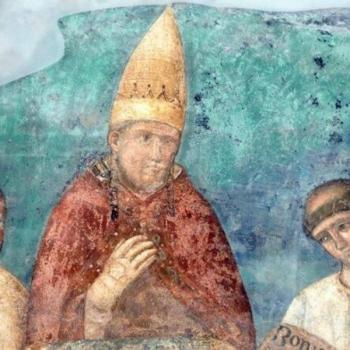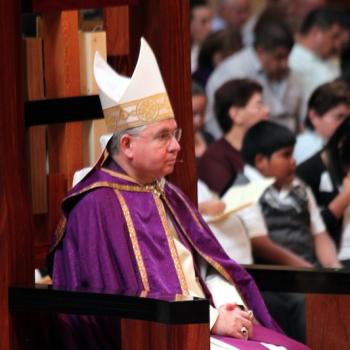I recently finished reading Light of the World, a book by Peter Seewald where he interviews Pope Benedict XVI. The book got much attention right before its publication due to the Pope’s comment on condoms, yet that takes up a whole two paragraphs of the 219 page text. The book contains many interesting and surprising answers. It gives great insight into the Pope’s thoughts and opinions on world events and current Church affairs.
I feel a closeness to Pope Benedict since I arrived to seminary in Rome only four months after his election in 2005. I lived through the publication of his first encyclicals, his first trips and his first high-profile meetings. I remember going to the Vatican bookstore to purchase Deus Caritas Est on the morning it was published. I attended the pro-Pope rally the Sunday after he declined from speaking at Rome’s La Sapienza University after a professor-led controversy. I heard all the news from his historic trip to Turkey. I stood on the side of the road to watch President Bush drive by on his way to meet with him.
Here are some quotes or ideas that stood out to me with my comments. If you’d like to skip to a point of interest to you, there are the topics:
I. New Language to Express the Faith
II. The Williamson Affair – The Holocaust Denier
III. Christianity not a Moral System
IV. Condom Statement
V. Ethics and Technology
VI. AIDS
VII. Priest Shortage
VIII. Marcial Maciel and the Legionaries of Christ
I. “People today no longer have an immediate intuitive grasp of the fact that Christ’s blood on the Cross is expiation for their sins. Formulas like these are great and true, but they no longer have a place in our overall system of thought and world view; they stand in need of a new translation and comprehension” (page 135)
The Pope speaks several times during the interview about the need for the Gospel message to be presented in a fresh and contemporary manner that the modern world will understand better. He mentions the atheist German philosopher Jurgen Habermas who urges the Church to express her beliefs and ideas in a language accessible to modern man especially since the Church has much to offer the world.
II. The Williamson Affair (page 120)
The Pope discusses the lifting of the excommunication of the traditionalist bishop Richard Williamson who openly denied the Holocaust. This scandal which arose in 2009 could have been avoided if the Church had heeded the advice of Jurgen Habermas. The Church has a particular system of language and governance that those within the system understand while those outside do not understand. When the Pope lifted the excommunication of Williamson it was a very specific and technical action that within Church governance was clear, but the world interpreted it as something else causing great scandal. This lack of communication and understanding despite the use of a common language is what Habermas criticizes of the Church. The Church needs to express itself in a way that the world can clearly understand.
The excommunication was lifted because Williamson, who had offended the primacy of the Papacy when ordained a bishop without Rome’s permission, was willing to recognize the primacy of Rome. The lifting of his excommunication did not in any way welcome him back into the flock of the Catholic Church nor was it an endorsement of his thoughts and opinions. The excommunication was lifted on the basis that he recognized the primacy of Rome. However, the public relations department of the Church handled the affair poorly, the Pope admitting now that no one took the initiative to perform a simple internet search on the man. Unbelievable.
III. “The Church is not here to place burdens on the shoulders of mankind, and she does not offer some sort of moral system. The really crucial thing is that the Church offers Him [Jesus]”
Many erroneously reduce Christianity to a moral code. It is common to hear people say, “oh, he is a good Christian man, always behaving correctly, never doing any wrong.” The problem with this statement is that it reduces Christianity by equating Christianity with acting a particular way. Yet Christianity is about a relationship with God, not a moral code. The goal of the Church is to lead people to Christ where they will find happiness. Any moral guidance the Church offers is to help us achieve union with Christ and find happiness, not to control our lives or to place burdens on our shoulders. Morality is about recognizing the presence of God in us and those around us and acting accordingly.
IV. “There may be a basis in the case of some individuals, as perhaps when a male prostitute uses a condom, where this can be a first step in the direction of a moralization.”
“[The Church] of course does not regard it as a real of moral solution [using condoms], but in this or that case, there can be nonetheless, in the intention of reducing the risk of infection, a first step in a movement toward a different way, a more human way, of living sexuality.” (119)
To better understand this statement, one must recall that the Church forbids the use of condoms because they are contraceptives. This highly hypothetical statement is about male prostitutes where contraception is not an issue since two men cannot conceive a child. The condom is not used as means of contraception in these cases, so the Pope speculates that its use here may be a first step towards a more human way of living sexuality since there is awareness to avoid spreading a disease.
The second statement is linked to the first. The Pope believes if a male prostitute uses a condom it is a first step towards a more human way of living sexuality. The speculation of this text does not constitute a change in Church teaching regarding condoms and the Pope still criticizes their free distribution and its effects on sexuality.
The Pope in no way opens up the door to the free use of condoms, but rather, since he asserts condoms are not a moral solution, his statement cannot be seen as a moral solution.
For a good article on this issue by Father Joseph Fessio, SJ click here.
V. “Man’s power has grown. But what did not grow along with it was his ethical potential.” (44)
The Pope discusses environmental issues asserting we need to be conscious of God’s creation as technology progresses. Many environmental catastrophes have been caused in the name of progress. The Pope suggests that simply because we CAN do something does not mean we are allowed to do it or entitled to it. The fact that a particular technology exists does not give us the right to use it without considering the repercussions it will have on the environment and future generations.
VI. “Twenty-five percent of all Aids victims around the world today are treated in Catholic facilities” (117)
“The Church does more than anyone else [for AIDS patients], because she does not speak from the tribunal of newspapers, but helps her brothers and sisters where they are actually suffering.” (118)
The Catholic Church is usually portrayed in the media as a foe in the battle and treatment for AIDS, yet the truth is far from it. Just the international Catholic HIV/AIDS Network operates in 107 countries providing care for AIDS patients.
VII. “there are more, not fewer, priests today in proportion to the number of those who attend Mass (148)”
This fact is mentioned by the interviewer as part of a question. It’s a very revealing point. There are less priests in the Church today, but there is also a much reduced number of practicing Catholics worldwide, so the ratio holds.
VIII. “To me Marcial Maciel remains a mysterious figure” (38)
The Pope has some harsh words on Marcial Maciel, founder of the Legionaries of Christ. One of his first actions as Pope was to retire Maciel and order him to spend the rest of his days in prayer and penance. After his death in 2008, allegations against him were confirmed leading to a high-profile investigation of the Legionaries of Christ. The final report stated Maciel was “devoid of scruples and authentic religious sentiment.”












